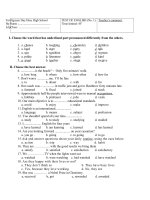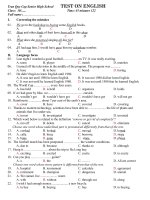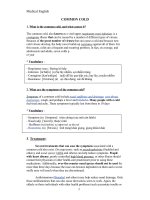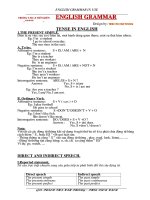English
Bạn đang xem bản rút gọn của tài liệu. Xem và tải ngay bản đầy đủ của tài liệu tại đây (89.46 KB, 3 trang )
<span class='text_page_counter'>(1)</span><div class='page_container' data-page=1>
REPORTED SPEECH WITH INFINITIVE (Tường thuật với động từ nguyên mẫu )
*.Với một số câu nói trực tiếp ( Direct speech ), thay vì dùng cách tường thuật thông thường bắt đầu bằng “
He / She said that …..” hoặc “ He / She told me that …….” , thì ta có thể dùng “ To – infinitive”. Cách dùng
này được áp dụng căn cứ vào ý nghĩa của câu nói trực tiếp, như các trường hợp sau đây :
<b>1.Tường thuật câu mệnh lệnh hoặc yêu cầu/ đề nghị : Ta dùng động từ giới thiệu “order” cho câu mệnh</b>
lệnh và dùng động từ giới thiệu “tell / ask” cho lời yêu cầu/ đề nghị.
Structure : “ tell / ask / order + s.o + ( not ) to do sth”.
Ex : “ Stay in bed until you feel better”, said the doctor.
The doctor told me to stay in bed until I felt better.
“ Please,don’t use your cell – phones during the take- off”, she said.to the passengers
She asked the passengers not to use their cell – phones during the take- off.
<b>2. Chúng ta cũng dùng “ To – infinitive” để tường thuật khi câu nói trực tiếp mang ý nghĩa diễn tả lời</b>
khuyên ( Advice ), lời hứa ( Promises), lời cảnh báo / khuyến cáo ( warnings ), etc ….
a. Tường thuật lời khuyên : advise + s.o + ( not ) to do sth. ( khuyên ai làm ( khơng làm ) điều gì
Ex : “ You should sell your old car”, said my father.
=> My father advised me to sell my old car.
“ If I were you, I wouldn’t buy that house”, said my sister.
My sister advised me not to buy that house.
<b>b. Tường thuật lời hứa: “ Promise + s.o + ( not ) to do sth” ( Hứa với ai làm ( khơng làm ) điều gì.</b>
“ I will send you the ticket as soon as I get it”, Ben told me.
Ben promised to send me the ticket as soon as he got it
c. Tường thuật lời đe dọa ( Threats) : “ threaten + s.o + to do sth” ( Đe dọa ai làm điều gì )
Ex : I’ll shoot if you move”, said the robber.
The robber threatened to shoot if I moved.
<b>d. Tường thuật lời cảnh báo / khuyến cáo ( warnings ) : “ warn + s.o + ( not ) to do sth</b>”. ( Cảnh báo /
khuyến cáo ai làm ( khơng làm ) điều gì.
Ex : “ Don’t come too near the fire”, said the woman.
The woman warned us not to come too near the fire.
<b>e. Tường thuật lời mời ( in vitation ) : “ invite + s.o + to do sth” ( Mời ai làm gì )</b>
Ex : Would you like to go on a picnic with us this weekend?”, said Mai.
Mai invited me to go on a picnic with them that weekend.
<b>f. Tường thuật lời nhắc nhở ( reminders ) : “ remind + s.o + to do sth” ( nhắc nhở ai làm gì )</b>
Ex : “ Don’t forget to turn off the lights before leaving the room.”, Sue told me.
Sue reminded me to turn off the lights before leaving the room.
<b>G. Tường thuật lời động viên , khích lệ ( Encouragements ) : “ encourage/ urge + s.o + to do sth.” (động</b>
viên , khích lệ ai làm gì )
Ex: “ Go on, take part in the competition”, said my father.
My father encouraged me to take part in the competition.
<b>J. Tường thuật lời cầu khẩn : “ beg / implore + s.o + to do sth” ( cầu khẩn ai làm gì ) </b>
Ex : “ Do me a favor, please”, said the servant to his master.
The servant begged/ implored his master to do him a favor.
<b>EXERCISE IV : Tường thuật những câu sau ; sử dụng động từ tường thuật cho trong ngoặc đơn.</b>
1.” Don’t go there alone, Julia!” Meg told her. ( warn )
=> ...
2. “ You had better take a short holiday, June”, said Pauline. ( advise )
=> ...
3. “ Don’t argue with me”, the teacher said to the boy. ( order )
<b>=> ...</b>
4. “ Do you want to go out for cinner with me, Kate”, Felix said. ( invite )
=> ...
5. “ I’ll follow you wherever you go”, Meg told Peter. ( promise )
</div>
<span class='text_page_counter'>(2)</span><div class='page_container' data-page=2>
=> ...
7. “ If I were you, I wouldn’t accept his invitation”, Kim said to Lynn. ( advise )
=> ...
8. “ Remember to put your dirty clothes in this basket, boy”, said the mother. ( remind )
=> ...
9. “ Follow that car”, the detective said to the taxi- driver. ( order )
<b>=> ...</b>
10. “ Go on, send your short story to the magazine”, Pamela said to Paul. ( encourage )
<b>=> ...</b>
11.‘Read the questions twice,’ said the teacher, ‘and don’t write in the margin.’
<b>=> ………</b>
12. ‘You’d better not leave your money lying about,’ said one of the students. (advise)
<b>=> ………</b>
13. ‘Why don’t you open a bank account?’ said another.( advise)
<b>REPORTED SPEECH WITH GERUND ( Câu t ư ờng thuật với danh động từ ) </b>
<b>*.Cách tạo ra danh động từ : Lấy động từ nguyên mẫu thêm “ ing” : V-ING </b>
<b>Ex : write -> writing ; sit -> sitting; read -> reading; …</b>
<b>Chúng ta dùng gerund để tường thuật khi câu nói trực tiếp mang ý nghĩa đặc biệt. Có khá nhiều động </b>
<b>từ được dùng để tường thuật theo cách này tùy theo ý nghĩa của câu trực tiếp. Sau đây là một số động </b>
<b>từ thông dụng : </b>
<b>1. “ Accuse S.O of doing sth” ( Buộc tội ai về việc gì .)</b>
<b>Ex : “ You stole my car”, the man said to the boy.</b>
<b>The man accused the boy of stealing his car.</b>
<b>2. “ Admit doing sth” ( thừa nhận đã làm gì )</b>
<b>Ex : “ I’m afraid I’ve lost your book”, Kenvin told me.</b>
<b>Kenvin admitted losing my book.</b>
<b>3. “ Apologize for doing sth” ( xin lỗi vì đã làm gì ) / {“ Apologize to S.O for doing sth”}</b>
<b>Ex : “ I’m sorry I’m late”, Nam said.</b>
<b>Nam apologized for being late.</b>
<b>4. “ Blame S.O for doing sth” ( đổ lỗi cho ai về việc gì )</b>
<b>Ex : “ It was your fault. You gave us unclear instructions”, he said.</b>
<b>He blamed me for giving them unclear instructions.</b>
<b>5. “ Congratulate S.O on doing sth” ( Khen ngợi / chúc mừng ai về việc gì. )</b>
<b>Ex : “ Well done, Brian, you’ve passed the exam”, said his father.</b>
<b>Brian’s father congratulated him on passing the exam.</b>
<b>6. “ Deny doing sth” ( phù nhận đã làm gì )</b>
<b>Ex : “ I didn’t break your glasses”, the boy said.</b>
<b>The boy denied breaking my glasses.</b>
<b>7. “ Insiston / upon doing sth” ( cứ khăng khăng địi làm gì ) </b>
<b>“ I really must see the manager in prison”, the man said.</b>
<b>The man insisted on seeing the manager in prison.</b>
<b>8. “ Suggest doing sth” ( đề nghị làm gì ) </b>
<b>Ex : “ Why don’t we share the cost?”, Carol said.</b>
<b>Carol suggested sharing the cost.</b>
<b>9. “ Thank S.O for doing sth” ( Cám ơn ai về việc gì )</b>
<b>Ex : “ Thank you very much for telling me the way to the post office.”, she said.</b>
<b>She thanked me for telling her the way to the post office.</b>
<b>10. “ Warn S.O agaist doing sth” ( khuyến cáo ai đừng làm gì )</b>
<b>“ Don’t drink the local water.” Said the guide.</b>
<b>The guide warned us agaist drinking the local water.</b>
</div>
<span class='text_page_counter'>(3)</span><div class='page_container' data-page=3>
=> I congratulated Van...
2. “ You failed to save my husband’s life”, she said to the doctor.
=> She blamed ...
3. “ I didn’t reveal the company’s confidential information.”, Marian said.
=> Marian denied ...
4. “ How about meeeting in front of the cinema?”, Pat said.
=> Pat suggested ...
5. “ You damaged my new CD, Meg.”, Tom said to me.
=> Tom accused ...
6. “ Let me pay for the meal.”, Ben said to me.
=> Ben insisted ...
7. “ Why don’t we drive instead of taking the train?”, Minh said
=> Minh suggested ...
8. “ Beware of that bad road! It’s very dangerous to drive on it!”, he warned us.
=> He warned ...
9. “ Yes. I’ve spent too much money doing the shopping”, she admitted.
=> She admitted ...
10. “Congratulations ! You’ve succeeded in the interview, Lan”, My mother told me.
</div>
<!--links-->









